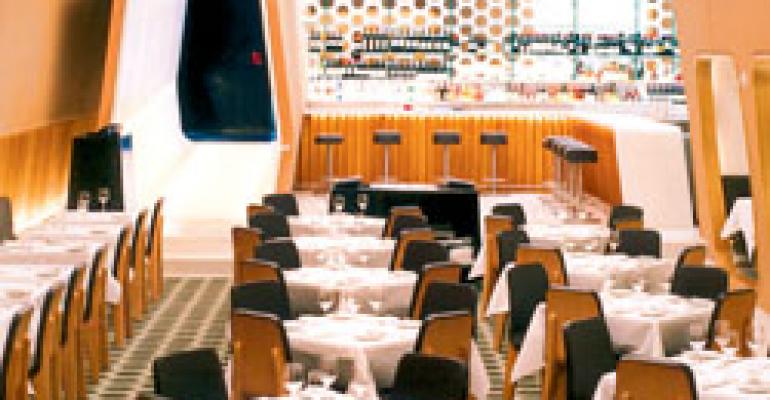With the recession still gripping the country by its purse strings, luxury is out, value is in and fine dining is facing the daunting task of redefining itself.
Most fine-dining operators agree that the segment is not in jeopardy of disappearing entirely, but a shakeout is underway. Many fine-dining eateries are closing their doors, and those operators trying to stay viable have ramped up their efforts to casualize while still maintaining some of the upscale elements that make fine dining, well, fine.
“Special occasions still exist, and people are still going out; they’re just looking to pay a lower price for it,” said Adam Werner of Southland, Mich.-based consulting firm AlixPartners LLC. “Our expectation is that there is going to be a shift in consumer spending at large, so these companies need to figure out how to do more with less. There definitely are some learning moments here.”
Such economic factors as weakened tourism, tightened corporate budgets and recession-weary consumers are not only contributing to that education, but also forcing several upscale eateries to shutter.
In the past two months, such New York fine-dining establishments as Ago, Atria and Lever House have closed. In Boston, diners are saying goodbye to Aujourd’hui, Great Bay and Icarus. And in Philadelphia, fine-dining stalwart Susana Foo Chinese Cuisine has turned off its lights.
The contraction within the segment is not altogether unexpected as the pool of potential diners declines, observers say. Nor does it mean that fine dining is dead. Instead, fine dining is in the throes of a sea change as it reinvents itself for the future, they say.
Werner of AlixPartners said he expects many in the fine-dining segment to step up their use of coupons and renegotiate contracts with suppliers, distributors and landlords.
Still, the desire for great food and service will never change—no matter how bad the economy gets, said Paul Bolles-Beaven, president of core business for New York’s Union Square Hospitality Group, operator of such upscale concepts as Gramercy Tavern, Eleven Madison Park, Tabla, the Modern and Union Square Café.
“I do think people are responding to the opportunity to spend less money and experience something wonderful at a lesser price point, but it’s an oversimplification to say that everything will become less formal or that the portions will start getting larger,” he said. “Fine dining is in the eye of the user, but the idea that the economy will ring the death knell for it is not true.
“Maybe it’s true that people are thinking more carefully about spending money, but the people who care about [enjoying] the highest level of the culinary experience will always seek it out.”
A poor location was the primary problem the fine-dining seafood restaurant Great Bay faced, said co-owner Christopher Myers. Myers and partner chef Michael Schlöw also own Radius, a power-house of Boston’s fine-dining scene.
Great Bay, which opened in the Hotel Commonwealth in Kenmore Square in 2003, was located in a transitional neighborhood that wasn’t ready for an upscale restaurant at the time of its debut, Myers said. Although it never really caught on with area diners, the recession pushed it toward its eventual demise, he said.
“Kenmore Square was the only blighted neighborhood in what Boston considers the Back Bay,” he said. “It was a relatively expensive restaurant in a neighborhood that was not ready for it then, but is now. And directly across the street was a construction site. You just don’t get over that if you are appealing to the smallest percentage of diners. I don’t think the economy is the reason for the closing, but we certainly didn’t have a great deal of momentum going, so when the economy bombed out we were susceptible. The transitional economy definitely was the tipping point.”
Despite his experience with Great Bay, Myers said he is not deterred from opening other fine-dining restaurants. He noted, however, “I think the rules of the game will change.”
Myers said he anticipates more downscaled fine-dining restaurant designs and lower prices—at least until the economy improves—as well as a more relaxed use of high-quality ingredients in order to maintain costs.
“It’s funny,” he said. “I was reading this article by a blogger in Boston who said that fine dining was going to go the way of the dinosaurs. But I don’t believe that’s true or has to be true.
“Maybe the atmosphere will be three-star even though the food is four-star,” he continued. “It’s sad, but the big, showier restaurants might be fewer and far between. You may see more generic dining for a while, but by no means do I think fine dining will disappear.”
Drew Nieporent, co-founder of New York’s Myriad Restaurant Group, owner-operator of such up-scale establishments as Corton, Nobu, Tribeca Grill, Mai House and Centrico, agrees that fine dining isn’t going anywhere.
“All of us in the foodservice business feel there is some sort of place for fine dining, but we also pioneered the casualization of it,” Nieporent said. “That doesn’t mean we want it to go extinct, but we have relaxed the rules to where dress codes or a pretentious experience have disappeared.”
Nieporent added that although consumers are demanding more casual comfort when dining out, they still want to savor the special occasion that is associated with fine dining.
“At the end of the day, people want to experience eating with the best china and glassware and have the best food available,” he said. “Along with fine dining comes the expense of the service and those who are executing the food. Maybe it becomes a much smaller market. There’s going to be a shakeout. That’s the nature of competition, especially in a busy marketplace like New York.”— [email protected]

